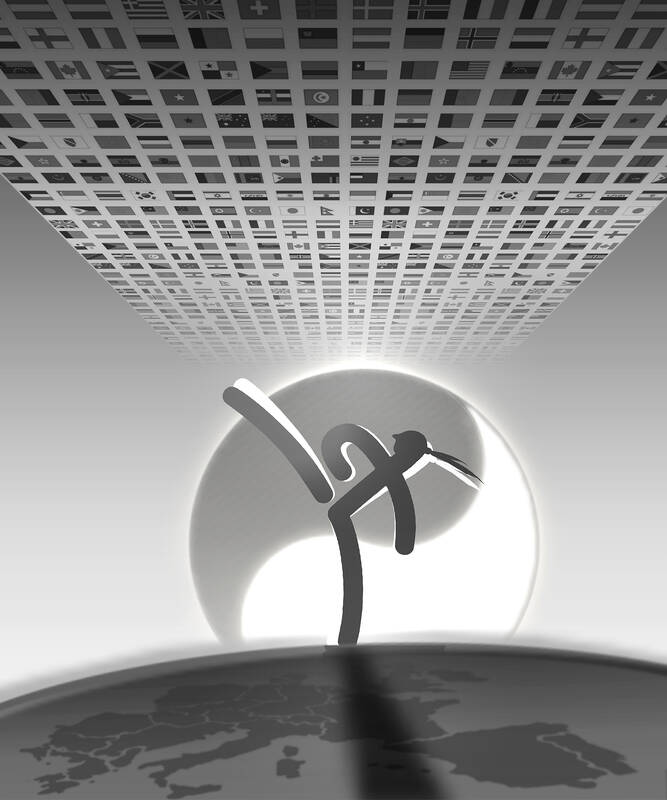Squid Game gripped viewers in 94 countries, becoming the most watched Netflix show ever. The Oxford English Dictionary added 26 Korean words. The K-pop band BTS has topped charts internationally and met US President Joe Biden at the White House this summer.
After sweeping through Asia years ago, hallyu — the “Korean wave” of culture — has crashed upon Western shores, as documented in a new exhibition at the Victoria and Albert Museum in London. This is a serious business.
A recent book, Shrimp to Whale, plays on an old saying portraying South Korea as a tiny creature surrounded by leviathans, and captures its triumphant postwar ascent from abject poverty and trauma.

Illustration: Yusha
South Korea still regards itself as a middle power, but in economics, technology and especially culture, it is now a powerhouse. One government source jokes that soft power — a country’s ability to get what it wants through attraction rather than coercion or payment — is the South’s nuclear weapon.
Joseph Nye, who coined the term “soft power” in the late 1980s, has suggested that it depends on a nation’s culture, political values and foreign policies. Building it is not as straightforward as amassing the bombs and tanks required for hard power.
China has invested heavily in soft-power initiatives, but has yet to produce a pop band like Blackpink or a film like Snowpiercer. Its determination to micromanage cultural projects hampers its ability to appeal to foreign audiences. Nye suggested that China’s influence remains limited as long as it “fans the flames of nationalism and holds tight the reins of party control.”
In contrast, democratic South Korea has pursued an arm’s-length approach, modeled partly on UK initiatives such as the British Council. Squid Game and the Oscar-winning Parasite hardly shed a flattering light on the nation that produced them. The stories triumphed by capturing the monstrous cruelties and inequality of modern capitalism in South Korea, in a way that has resonated more widely.
The strategy is a recognition that soft power belongs to nations, not governments. The origins of South Korea’s status as a cultural behemoth are complex, but if the state can take some credit, civil society should take more. There was outrage in 2016 when it emerged that then-South Korean president Park Geun-hye’s administration had blacklisted thousands of artists and entertainers — a reversion to the kind of censorship and punishment once seen under authoritarian leaders, including Park’s father. It is the people who have nurtured, promoted and defended media and artistic independence.
Globally, this is an era in which diplomatic platitudes have been stripped away, and force laid bare once more. Nationalist strongmen are in charge around the world. Moscow’s invasion of Ukraine was the ultimate assertion of hard power. Yet the video addresses by Ukrainian President Volodymyr Zelenskiy, who has so consummately inhabited the role of war leader — along with the sharing of daily life by citizens, even the defiant humor of the country’s postage stamps — have all bolstered public support for Ukraine in other countries.
In doing so, Ukrainians have helped to maintain the political will to keep supplying it with heavy weaponry in the face of the Russian menace. Soft power is hard to define and harder to master, but it counts.

There is much evidence that the Chinese Communist Party (CCP) is sending soldiers from the People’s Liberation Army (PLA) to support Russia’s invasion of Ukraine — and is learning lessons for a future war against Taiwan. Until now, the CCP has claimed that they have not sent PLA personnel to support Russian aggression. On 18 April, Ukrainian President Volodymyr Zelinskiy announced that the CCP is supplying war supplies such as gunpowder, artillery, and weapons subcomponents to Russia. When Zelinskiy announced on 9 April that the Ukrainian Army had captured two Chinese nationals fighting with Russians on the front line with details
On a quiet lane in Taipei’s central Daan District (大安), an otherwise unremarkable high-rise is marked by a police guard and a tawdry A4 printout from the Ministry of Foreign Affairs indicating an “embassy area.” Keen observers would see the emblem of the Holy See, one of Taiwan’s 12 so-called “diplomatic allies.” Unlike Taipei’s other embassies and quasi-consulates, no national flag flies there, nor is there a plaque indicating what country’s embassy this is. Visitors hoping to sign a condolence book for the late Pope Francis would instead have to visit the Italian Trade Office, adjacent to Taipei 101. The death of
The Chinese Nationalist Party (KMT), joined by the Taiwan People’s Party (TPP), held a protest on Saturday on Ketagalan Boulevard in Taipei. They were essentially standing for the Chinese Communist Party (CCP), which is anxious about the mass recall campaign against KMT legislators. President William Lai (賴清德) said that if the opposition parties truly wanted to fight dictatorship, they should do so in Tiananmen Square — and at the very least, refrain from groveling to Chinese officials during their visits to China, alluding to meetings between KMT members and Chinese authorities. Now that China has been defined as a foreign hostile force,
On April 19, former president Chen Shui-bian (陳水扁) gave a public speech, his first in about 17 years. During the address at the Ketagalan Institute in Taipei, Chen’s words were vague and his tone was sour. He said that democracy should not be used as an echo chamber for a single politician, that people must be tolerant of other views, that the president should not act as a dictator and that the judiciary should not get involved in politics. He then went on to say that others with different opinions should not be criticized as “XX fellow travelers,” in reference to